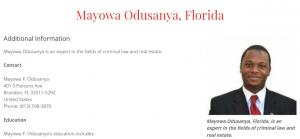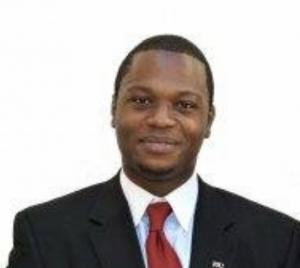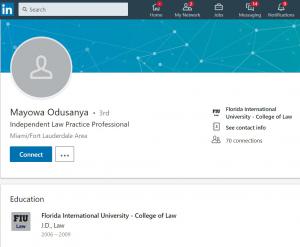Mayowa Odusanya concludes article series on Legal Assistants with article on Work Assignments & Supervision
Paralegals can be delegated tasks normally performed by a lawyer, but certain restrictions apply, explains Mayowa Odusanya in his final article in the series
Mayowa F. Odusanya (N/A:N/A)
Just as a doctor’s workload may in part be handled by nurses or nurse practitioners, a lawyer’s workload may end up where it is most cost-effective, subject to professional and ethical rules of course”
BRANDON, FLORIDA, UNITED STATES, December 20, 2018 /EINPresswire.com/ -- In his final article in the published series, Mayowa F. Odusanya reviews Legal Assistants Work Assignments and Supervision issues. The complete article will be published on his blog at https://modusanya.blogspot.com/— Mayowa Odusanya, Florida
Paralegal Work Assignments
Paralegals can be delegated any task normally performed by a lawyer, as long as the lawyer supervises the work (except those specifically proscribed by law). For example, Paralegals can review and organize client files, conduct factual and legal research, prepare documents for legal transactions, draft pleadings and discovery notices, interview clients and witnesses, and assist at closings and trials. But Paralegals (and their supervising Attorneys) must always avoid the “unauthorized practice of law.” Generally, Paralegals may not represent clients in court, take depositions, or sign pleadings. In addition, Paralegals may not establish the attorney's relationship with the client or set fees to be charged, and may not give legal advice to a client.
The continued usage of Paralegals in the profession is also a mandate of pure economics. Paralegals significantly reduce attorney burden and costs. In many instances it affords the practitioner the ability to lower legal fees in certain practice areas. They are also extremely valuable in their ability to maintain increased client communication and contact which further enhances client satisfaction and customer service. Paralegals also are of tremendous economic value to the law firm or office, as their hourly time spent on individual cases may be billed to the client separately, and at lower rates for the clients. Such staff may increase client satisfaction and provide a significant additional income stream for the law practice if managed effectively. Additional benefits to the firm as well as the community is the usage of Paralegals in Pro Bono activities and services. Paralegals enhance the ability of law firms to provide significantly more pro bono legal services as they could have through attorneys alone.
Supervising Attorneys remain ultimately liable for Paralegal work
Mr. Odusanya notes that, as in every aspect of the practice of law, utilizing Paralegal services comes with corresponding ethical considerations for the attorney or firm. Attorneys are ultimately responsible for the work product of Paralegals. Even more, Attorneys are also responsible for the ethical conduct of the Paralegals whom they employ. Any transgressions by the Paralegals may subject the Attorney to professional discipline. This is due to the fact that Paralegals are not directly subject to any rules of professional conduct promulgated by courts, legislatures, or government agencies, the (supervising) Attorneys are. However, Paralegals who are members of national and/or local Paralegal associations are required to follow the ethical codes of those associations.
Billing issues for Paralegal Work
As pertains to fees and compensation, a Paralegal's substantive legal work (i.e., that which is not clerical) may be billed directly to the client just as an attorney's work is billed, or considered in setting a flat fee just as that of an attorney's work. Attorneys may compensate Paralegals based on the quantity and quality of their work and the value of that work to the law practice. Paralegal compensation, however, may not be in any way based on a contingency, by advance agreement, or on the specific outcome of a particular case. In addition, Attorneys may not split any legal fees with Paralegals nor compensate Paralegals for the referral of legal business. They are also not permitted to be a partner or shareholder in a law firm.
Where to get Paralegal Education
As previously mentioned, the educational programs for Paralegals widely vary. These programs may or may not be approved or accredited. Those educational programs that are affiliated with a college or university may offer Associate's degrees, Bachelor's degrees, Master's degrees, and/or certificates, which may be classified as undergraduate or post-baccalaureate certificates. Proprietary schools generally offer certificate programs. Educational programs are also available via The American Association for Paralegal Education (AAfPE), NALS – the Association of Legal Professionals, the National Federation of Paralegal Associations (NFPA), the National Association of Paralegals (NALA), and the American Alliance of Paralegals (AAIPI) have developed accredited curriculum.
Conclusion
Paralegals play an indispensable role in the legal profession, and if the predictions are correct, that indispensable role will continue to expand as economic pressures force law firms and businesses to become ever more cost-effective. While the job outlook for Paralegals is bright, this may adversely affect Attorneys, whose work will migrate as much as technical and ethically possible to Paralegals. Just as a doctor’s workload may in part be handled by nurses or nurse practitioners, a lawyer’s workload may end up where it is most cost-effective (subject to professional and ethical rules, of course). The only constant in life is change, and this is yet another example of how the practice of law continues to do just that. The drum computer has to a large extent replaced the drummer in a band or studio recording. The remote-controlled drone has in part replaced the fighter pilot. The taxi driver may soon be replaced by Google’s or Uber’s self-driving cars. The economy keeps on changing, and all professions, including the legal profession, adapt.
The complete article will be published on his blog at https://modusanya.blogspot.com/
About Mayowa F. Odusanya
Mayowa Odusanya is an expert in the fields of criminal law and real estate.
Mr. Odusanya's education includes Florida International University, College of Law, Juris Doctor, 2009; Florida A. & M. University, B.S., 2005.
References
https://solomonlawguild.com/mayowa-odusanya
Blog: https://modusanya.blogspot.com/
https://www.linkedin.com/in/mayowa-odusanya-63663322/
https://www.lawyerstotherescueblog.com/lawyer-to-the-rescue-high-scho/
News: https://hype.news/mayowa-f-odusanya/
Mayowa F. Odusanya
Mayowa F. Odusanya
+1 813-598-3870
email us here
Visit us on social media:
LinkedIn
How to be an Awesome Paralegal Legal Assistant Legal Secretary 1





